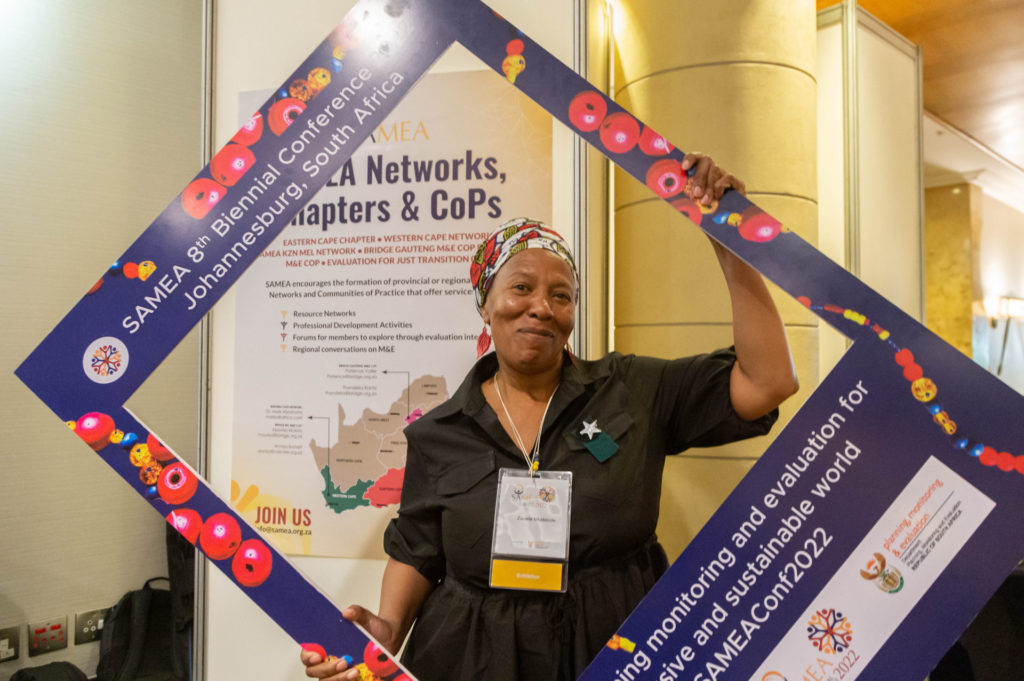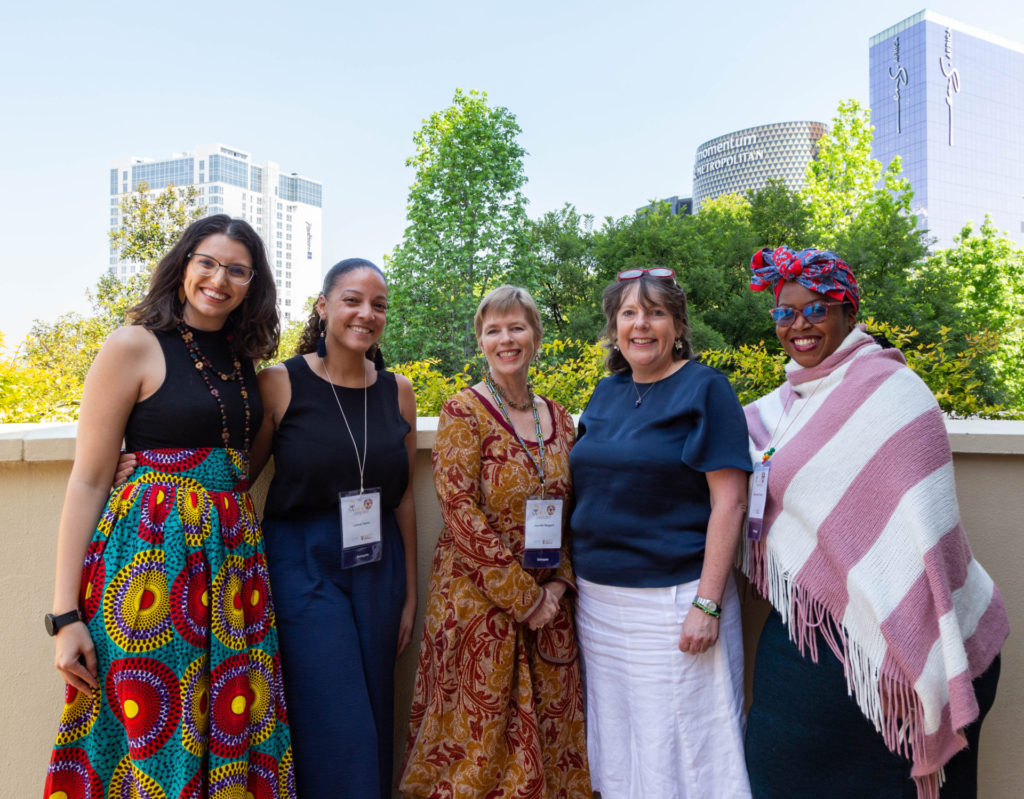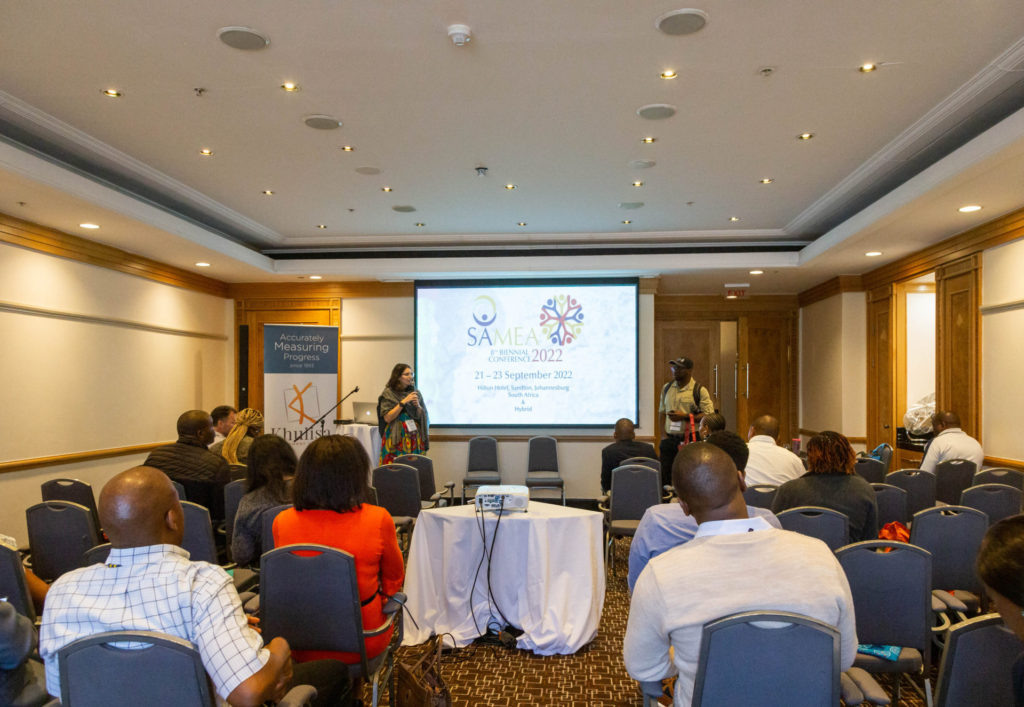The South African Monitoring and Evaluation Association (SAMEA) 8th Biennial Conference took place from September 21-23, 2022, in Johannesburg, South Africa. The theme of SAMEA 2022 – which was co-hosted by South Africa’s Department of Planning, Monitoring and Evaluation (DPME) and UNICEF – was: “Transforming monitoring and evaluation for an inclusive and sustainable world.”
Khulisa’s conference team was incredibly excited to participate in SAMEA 2022 and connect with our evaluation colleagues from around South Africa, especially after more than two years of covid isolation and Zoom meetings.


SAMEA by the Numbers
The in-person conference – SAMEA’s first since 2019 –was also enabled for virtual participation and included several free, online workshops in the days leading up to the conference. Attendance included 795 participant logins at the pre-conference workshops, approximately 370 physical attendees at the main conference, and 60 virtual attendees at the main conference. Fourteen countries participated in the conference and 73 abstracts were selected for presentation.
The Focus of SAMEA 2022
“The economic, social and humanitarian crises that were exacerbated by COVID-19 have highlighted the important role of the M&E profession in delivering credible, timeous and useful information to inform decision making,” The SAMEA conference programme reads. “The challenges of collecting evidence, sharing information, and interpreting information in the context of uncertainty caused by constant change and the need for rapid response presents specific challenges to those undertaking M&E in a pandemic or crisis.”
The conference programme included six “strands” (learning areas), focused on addressing these challenges:
Strand 1: Planning, Monitoring, and Evaluation to Address Systemic Crises for a Just Transition
“Focus on the transformative role of planning, monitoring, and evaluation products and practitioners in promoting just transition, economic and social inclusion, and responding to ecosystem breakdown, climate change, and biodiversity loss.”
Strand 2: Made in Africa Evaluation
“Focus on indigenous knowledge systems, frameworks, and paradigms that are contextually relevant and fit for purpose for programs, evaluation, and evaluation systems in Africa.”
Strand 3: M&E Evidence for Adaptive Management
“Focus on the processes to rapidly collect, collate, and share information to respond to crises situations (e.g. the pandemic), and promoting the systemic use of evidence for adaptive management.”
Strand 4: Monitoring & Data Management
“Data management practices and disciplines are at the heart of monitoring and evaluation. This strand will focus on experiences, lessons, and practices of the systemic collecting, analyzing, and using of quality data to foster data-driven decision making. As the World Development Report 2021 states, ‘the data revolution is transforming the world’; however, with the rapid increase in data use comes a responsibility to protect personal data while encouraging the transparency and sharing of information to respond to crises, enhance services, and improve lives. Without strong data management, internal and external monitoring and evaluation is very difficult. This strand aims to explore and enhance data management and the use of this secondary data in our African context.”
Strand 5: Tech-Enabled M&E
“The arrival of the COVID-19 pandemic in early 2020 forced many M&E practitioners, organizations, and government to move rapidly to digital operations, including remote data collection and greater use of existing data for M&E, including the use of drone, artificial intelligence and machine learning, and predictive analytics. At the same time, over the past few years there has been a greater emphasis on how to innovate ethically and responsibly manage the increasing amounts of data that we collect, use, share, and store for M&E purposes. The ICT-enabled M&E stream will focus on sharing challenges and good practice related to the responsible integration of digital tools and approaches into M&E.”
Strand 6: M&E Capacity Building & Emerging Evaluators
“This strand brings together M&E practitioners to build consensus on what works and does not work in capacity building initiatives delivered in the past few years. This discourse entails assessing whether the curriculum content, pedagogical approaches (theory versus practice), and modalities used in the delivery of training programmes are responsive to the ever-changing world and M&E praxis. In the end, the strand anticipates elucidating what it needs and ways to introduce improvements.”
Khuilsa hosted Strand 4, “Monitoring & Data Management”. This topic was the focus of several Khulisa presentations:
- Setting the Scene – Data at the Heart of the COVID-19 Response;
- Generating and Using Evidence in Crises and Emergency Contexts;
- Evaluation of Work-based Learning Programmes;
- BRIDGE M&E CoP: Actioning educational data: Have data, what next?;
- Data Café: Data Methods & Practice; and
- Where to From Here? Data, Quality & Learning.

Check out our #EvalTuesdayTips section (and keep an eye on it in the coming weeks) for more about Khulisa’s Strand 4 activities at SAMEA 2022.
Our team also attended numerous sessions in the other five strands. Key take-aways from Khulisa included:
- Strand 1: We can’t carry on business-as-usual, given climate change and other acute challenges facing Africa and the world. It’s no longer about climate change; it’s about climate adaptation and how to measure it.
- Strand 1: Climate change affects all the areas in which Khulisa works and we need to adapt accordingly.
- Strand 2: This strand is about decolonizing and demystifying evaluation. We must use indigenous knowledge systems and languages more effectively.
- Strand 2: How do we design evaluations and choose approaches that take into account indigenous knowledge systems?
- Strand 3: Instead of monitoring & evaluation, consider monitoring as As you monitor, you should be making decisions and valuing what’s happening with the data.
- Strand 3: We must move toward an evaluation culture that’s not just about looking at the tree, but looking at the whole forest.
- Strand 5: We often develop data collection apps that are user-friendly for participants but not organizations, which creates a challenge when analyzing and interpreting the data.
- Strand 6: Young evaluators need experience to gain
- Strand 6: Youth are often spoken about but not to. Often when they’re included, it’s a “tick box exercise”, not considering their engagement in a meaningful way.
Our team is now bursting with ideas and inspiration after SAMEA 2022 – we already can’t wait for the next biennial conference. For a more detailed discussion of SAMEA 2022, the strands, and their outcomes, please stay tuned for the release of the 2022 SAMEA Conference Report.